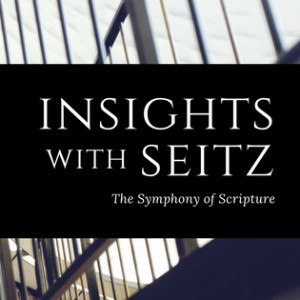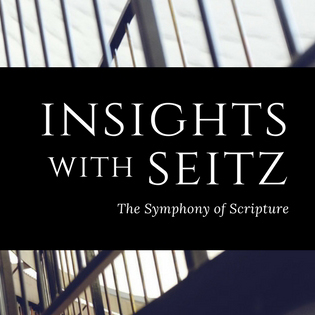Episodes

Wednesday Nov 18, 2020
First Sunday in Lent, February 21st, 2021
Wednesday Nov 18, 2020
Wednesday Nov 18, 2020
The Gospel of Mark is notable for its brisk, compressed style, as we have seen. Especially in chapter one. The first Sunday of Lent is always the account of Jesus in the wilderness. Matthew and Luke give us 11 and 13 verse renditions. Mark has but two. The forty days, the three temptations back-and-forth between Jesus and Satan, is here a simple narrative summary. He was tempted, was with the wild beasts, and angels ministered to him.
The enmity between man and animal, in consequence of the fall, is here gone. The prophecy of Isaiah 11—wolf lying down with lamb and a little child in safe company—is likely part of the background of Mark’s terse account. The snake tempter of Eden is here without effect. “Jesus was with the wild beasts and the angels ministered to him.”
Notable is that the Holy Spirit descending upon Jesus at his baptism is the same Spirit who immediately drives him, tosses him in the Greek, into the wilderness. Matthew and Luke say the same thing but the link with Jesus’ baptism is not present in the same way because of their more amplified presentations. In Mark’s case, less is sometimes more. The Holy Spirit of baptism and filial declaration—you are my son--drives Jesus into a confrontation with the king of demons, Satan. In and by that same Spirit Jesus heals and drives out demons as chapter one unrolls. We have been witnesses of that.
Here is one of the places where the symphony of scripture can produce such compelling full-chord music. Coming alongside Mark’s compressed account of baptism and wilderness authority is the pairing of Noah and some very challenging lines from 1 Peter. Chosen because of the reference to baptism, and its pre-figurement in the ark, riding safe and high above the flood waters. The seas of destruction bearing upon them the eight saved, baptized, members of Noah’s family. The cycle of adamic sin and evil, stretching from the garden to Cain and Abel, to the spread of wickedness in the wake of angelic encroachment in the sphere of mortals, as rendered in Genesis 6. The wickedness of man on the earth, and the continual evil plotting of mortals reaches its limit for God in Genesis 6 and the decision is made to start again, and to save Noah and his family to do that.
1 Peter understands this period as one in which God waited patiently, but it does not say exactly for what, and it does not clarify the period of waiting. From Adam to Noah? Presumably for others to repent and join the 8. But only 8 were saved. Here 1 Peter and Genesis are in full agreement. Baptism is like the ark because the salvation is out of chaos and death. Peter calls it an appeal to God for a good conscience, the conscience of the suffering but righteous Christian he has just commended. Christ suffered and died for all, and so the anti-type is greater and more final than the noah type prefiguring it.
The baptism of Jesus brought with it the descent of the Holy Spirit in fullest measure, which in turn drove Jesus to confront Satan and drive out and put on notice the demonic realm at work on earth. We are baptized into that baptism and empowered by the Holy Spirit given by his life and death for us. His life and his death were a confrontation with evil and death, beginning in the wilderness and extending to the Cross and empty tomb. The cosmic dimension is underscored in places like Ephesians 4, and Colossians 2, Romans 10 and Revelation, in the scenes of earthquake and broken tombs and the rising of the saints at his death, in Matthew’s crucifixion account.
What is being described in 1 Peter 2:19 has been the subject of enormous discussion over the history of interpretation, with greats like Augustine changing their minds, Luther admitting the text is just not open to convincing single interpretation, Calvin disagreeing with Aquinas. Further opening onto notions of the afterlife and purgatory, the descent clause in our Creed, Holy Saturday liturgies of captivity taking captive, leading even to the ambitious musings of von Balthazar over Christ’s work on Holy Saturday, dropped into utter deathly godforsakeness so as to redeem all things. These latter topics of course do not trade on 1 Peter alone and it is important to keep this in view but on a wider grasp of what the time between Cross and tomb and Easter morning entails in God’s purposes in Christ Jesus, and the scriptures point to this.
The listener can breath easy. Our job does not entail giving the final word on this matter, but rather in trying to understand 1 Peter in relation to the main themes of Mark and Genesis. Baptism, spiritual authority, salvation, waters of chaos returning in Noah’s day for a work of judgment, and the waters of the Jordan releasing into our lives the spiritual authority of Jesus Christ the savior. 1 Peter describes a movement from death to resurrection to ascension and exaltation over angels and authorities and powers. What began at the Jordan, was prefigured in Noah and in the sacramental work of Christ in Israel in former days, is completed through cross, tomb, resurrection and exaltation.
Our baptism is a baptism into that full journey of triumph. It is an appeal to God himself, in and by Christ’s triumph, for a conscience worthy of our present life and calling. A conscience he has forged for us. The resurrection has forged this. The exaltation has put paid to it.
If Jude 6 and 2 Peter 2:4 and our text are speaking of similar things, and I believe they are, the interpretation closest to hand is that the spirits in prison are the fallen angels of Genesis 6, responsible in part for the wickedness unleashed and judged in the days of Noah. Between death and resurrection, the quickened spirit of Christ made proclamation to them, as part of the defeat of and exaltation over powers and authorities and angels with which our reading concludes. There is an arc of Christ’s saving work, from Noah to Jordan to Cross to tomb and back again, in final proclamation. The Spirit at work in Christ is not quelled even in death but continues at work, until raising our Lord to his new spiritual body amongst us on Easter, and lifting him into the heavenlies to sit at God’s right hand in authority.
The crucial thing to note is how the symphony of scripture, when properly conducted, helps clarify what are the main and reinforcing themes across passages. There will not again be a flood to eliminate the evil that persists on earth and in our hearts. Instead God sends his only Son to contend and win. Destroying death and sin reaching all the way back to Adam and Noah and putting Satan and the powers on notice in his life and death and rising and ascending, all four, that this is so. Mark’s linking of baptism and wilderness has to do with his terse style but it also speaks of his conviction about what the Spirit’s descent upon Jesus was truly about. 1 Peter extends that to the Spirit of Christ at work in death.
A variation on this interpretation is that “in that state” in Greek refers to his being made alive, not to his spirit preaching after death, and so to his resurrected state. The proclamation is then himself before the angels and spiritual powers opposed to him. I prefer the interpretation given but like Luther will admit the passage is difficult if taken in its own. We need the wider symphony of scripture to illumine those parts that at times are harder to understand. Christ’s life, death, resurrection and ascension are his saving victory for us over death and the powers of death, and we have been baptized and noah’s arc-ed into that new creation life with him.
The Psalmist entrusts his enemies to God, that they not triumph over him. Christ is our victor. Our own sins against him, as we remember them from days gone by, he asks that God look at through his love and compassion. And see us in that light. The covenant with Noah has in Christ been extended to all the children of Abraham, including us far off who have been brought near. The compassion and mercy of the LORD are from everlasting and forever, for those who lift up their soul to him.


No comments yet. Be the first to say something!